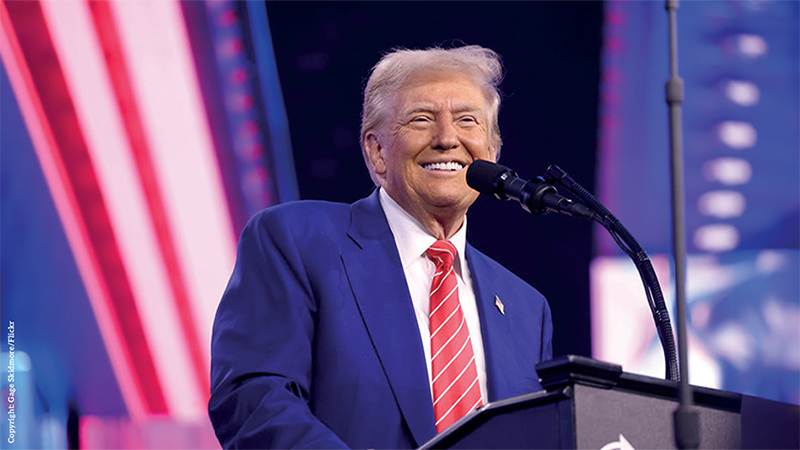Tariffs announced by President Donald Trump from the Rose Garden yesterday evening have undermined the investment case for Chinese, Indian, Japanese and other emerging markets equities.
Asian markets have fallen steeply in response to China, Japan, India, Vietnam and others facing new tariffs on exports to America ranging from 46% to 24%.
The European Union (EU) was also hit with a substantial 20% across the board tariff, but is in a stronger position to negotiate so the asset class may fare better according to some professional investors. The UK faces only the 10% baseline tariff.
Charles-Henry Monchau, CIO at Syz Group, said: “The Trump tariff proposal announced yesterday is near the worst case scenario.
“These are not small tariffs and are so large that the economic implications may not be the only impact. They are intensifying a global trade war that threatens to stoke inflation and stall growth.
“We note that the euro has strengthened, probably pricing in the fact that there is room for negotiation on the tariffs side, i.e these are not final tariffs, or that tariffs are so bad for the US that the euro is a safer place,” he continued.
“Overall, we keep some exposure to European stocks as we believe the shift from US stock to international stocks will continue. However, we are cognizant of the fact that earnings revision has not been following price action, i.e EU stocks are getting more expensive, limiting upside potential.”
See also: Spring Statement 2025: ISA reform prospects welcomed as ‘a real opportunity’
Altaf Kassam, Europe head of investment strategy and research, State Street Global Advisors, noted how hard Asia has been hit.
“Nowhere is this surprise clearer than in the rates levied against China and Vietnam, reflecting the Trump administration’s urgent desire to decouple its economy from China, meaning the equities of economies with strong trade linkages to China will also be hit, as well as those relying on China for growth”.
“As such, emerging market equities, particularly in Asia, appear most vulnerable to continued underperformance, as well as companies with complex global supply chains for whom recalibrating their business models will be a lengthy and complicated process.
“This negative ripple effect could also be exacerbated by currency weakness, both more immediately through and over the medium-term through monetary policy”.
Just a negotiating tactic?
David Coombs, head of multi asset at Rathbones, sees the announcement as ‘negotiating tactic’ rather than a permanent status.
“Well at least we know, or do we?” he said. “Classic Trump ‘shock and awe’. What happens next? Governments around the world scramble for a response. Australia and UK call for calm heads, EU and Canada more combative.
“This is clearly a negotiating tactic. Markets are taking fright as you would expect, with recession talk leading the word cloud. Sovereign bond yields lower, US Dollar lower and equities gaping down in the sectors most impacted,” Coombs continued.
See also: Advised platform assets jump to £616bn as bond sales rise
“Fortunately our positions in US, European, UK (long duration) and Australasian bonds are providing some protection this morning, plus our US Dollar hedges.
“I believe it’s too early to be too aggressive in adding to equities on mass, but we have plenty of cash to take advantage of any outsized moves in high conviction names.
“On balance, I think common sense will prevail and some concessions will be made to the US which will allow Trump to claim victory for the ‘rust belt’. However the next few weeks will be challenging, with risks and opportunities aplenty.”
According to Tomasz Wieladek, chief European economist at T. Rowe Price, the UK is ‘better placed to withstand tariff turmoil’.
“The UK will be least affected by the new policies,” he said. “I believe the overall negative effect on the UK economy will only be about 0.2-0.5% this year.
“This is mainly because trade diversion to the US via the UK is likely to be now significant. Plants producing anything in the UK will be more competitive than in the EU, which will support some domestic investment.
“The UK is a trade deficit country, and President Trump has just created significant excess capacity across the world. UK households will now benefit from much cheaper goods, raising disposable income,” he continued.
“Most importantly, the UK government implemented a large fiscal stimulus package six months ago, just in time to absorb the tariff hit. Despite the headwinds, the UK will do better in 2025 than the EU. A mild recession in the euro area in 2025 is now probable. The ECB will cut rates below the neutral rate to 1-1.5%.”
See also: Professional investors targeting risk-on assets to meet retirement needs








